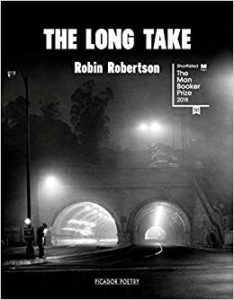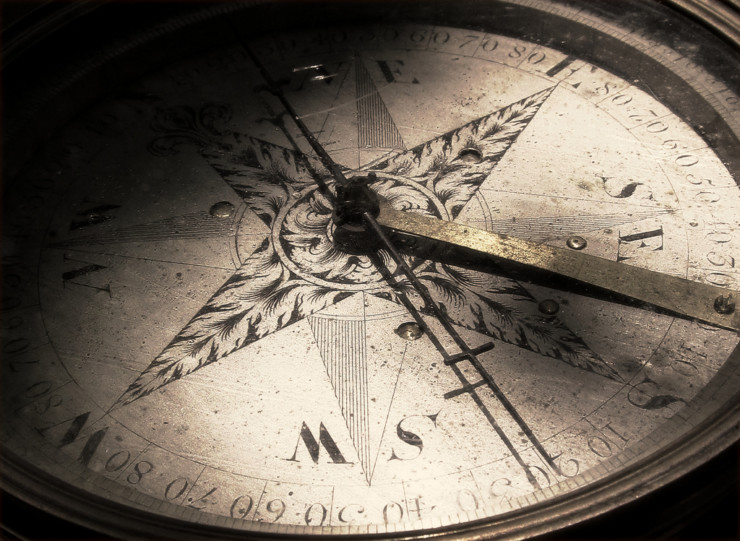British author Robin Robertson has accomplished the highly unusual if not impossible: he’s written a poetry book that was shortlisted for the 2018 Man Booker Prize. That’s a prize given for novels.
Robertson’s The Long Take, or A Way to Lose More Slowly, didn’t win the prize (that went to Milkman by Anna Burns), but making the Man Booker short list is something of an achievement. And there’s more. The Long Take is a poetry book, it’s a novel or something like a novel, and it unfolds like a noir movie. You’ve never read anything quite like this.

Part of the Bunker Hill neighborhood in 1940s Los Angeles
Admittedly, I was attracted by the connection to the noir genre of fiction; in fact, from what I read about it and the Man Booker nomination, I thought it was a noir novel. Only when I started reading it did I realize I had a poetry book in my hands.
Walker, the main character, is a Canadian veteran of World War II. When he returns home, he eventually lands in New York City. But this is the late 1940s, and California is beginning to exert its pull on the imagination. He takes the train west for Los Angeles. He finds a room in the old, rundown section of downtown. He makes a few friends.
One friend, named Billy, urges him to find a job with a newspaper, like The Press. He becomes a reporter, writing about the homeless, the down-at-heel, the forgotten people. Walker works and lives in the noir world of Los Angeles in the 1940s and 1950s, with a side trip to noir San Francisco for an extended reporting assignment. And what we come to see is that our reporter is suffering from post-traumatic stress disorder because of the war—specifically because of something that happened toward the end of the war, an event that destroyed his life, his romance with the girl back home, and any hope for a normal future. It’s why he can’t return home, even as he sends the occasional postcard to the girl he loved.
Here Walker is in his room in a boarding house, awakening after a long drinking bout:

a chair and table with a bowl for shaving, a mirror
with its glass split through.
His eyes are bad. He feels things
shift in the corners
but there’s nothing there.
His stomach’s in pieces.
The floor moves
and he thinks he sees rats running
right across the door.
There’s two of something in the mirror.
His kidneys hum.
He turns on the light and the whole ceiling’s crazed
Like old pottery. He blinks, looks again.
The cracks all gone.
The night’s drained out of the sky and it starts over.
The bottle’s lying on its side
but there’s still a drink in it.
The cockroaches watch from the walls.
As in almost all classic noir stories, the drinking is almost a character in itself. Walker spends a lot of time in bars, listening, forgetting, occasionally picking up the stereotyped women at home in a Raymond Chandler or Dashiell Hammett novel. This is a man who’s seriously broken, who believes the pieces can’t be mended. Even his physical surroundings are being broken, as downtown Los Angeles is rapidly being transformed by being torn down (even the hills) and built back up. All the while we’re getting closer to what happened to Walker in the war, and we realize that Walker is man looking for a redemption he doesn’t believe exists. California is not the future; it’s become the past.
And this is a poetry book.

Robin Robertson
Robertson, a native of Perthshire in Scotland, lives in London. He’s published several collections of poetry, many of which have received such recognitions as the E.M. Forster Award from the American Academy of Arts and Letters, all three Forward Prizes, the Roehampton Poetry Prize, and the Petrarca-Preis. He is a Fellow of the Royal Society of Literature and has also translated the work of Swedish poet Tomas Transtromer.
When I finished The Long Take, I walked outside, to reorient myself. This genre-bending poetry-book-gritty-novel-noir-movie left me astounded. When you read a work like this, a work that’s this good, you become the character. You’ve crawled inside his head and he’s crawled inside yours. And it’s unsettling.
Photo by Walt Stoneburner, Creative Commons, via Flickr. Post by Glynn Young, author of the novels Dancing Priest, A Light Shining, Dancing King, and the newly published Dancing Prophet, and Poetry at Work.
__________________________

“I require all our incoming poetry students—in the MFA I direct—to buy and read this book.”
—Jeanetta Calhoun Mish
- Poets and Fables: Steven Flint and “The Sun and the Boy” - July 3, 2025
- Poets and Poems: Alison Blevins and “Where Will We Live if the House Burns Down?” - July 1, 2025
- Poets and Poems: Paul Pastor and “The Locust Years” - June 26, 2025

Megan Willome says
This sounds oh so cool, Glynn! I love genre-bending, I really enjoy noir, and of course, I can’t live without poetry.
Back when the movie “Saving Private Ryan” came out, I was teaching water aerobics to a lot of people who lived through that war, and that was the first time I heard people admit to PTSD from that particular war (mostly it was the women admitting their men had it). All this happened around 9/11 as well, so there was this echo of history happening. All this makes me intrigued with this book, so thanks for your review.
Glynn says
I suspect that what we call PTSD today has been around for a long, long time. In World War I, it was called shell shock, but it was the same thing. There seems to have been a lot of it associated with Vietnam as well. Speculating, I think Vietnam might have been where things began to change — and eventually PTSD was OK to talk about.
Thanks for the comment, Megan!
Dave Malone says
Wonderful review, Glynn. So glad you chose this one to share. I am going to read this.